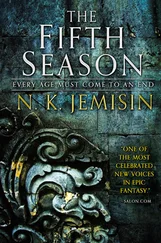“We’ll work hard not to disappoint you. My children, Tisanti and Ohorome.”
The children stepped forward to take her hand, murmuring greetings. Ohorome was the younger but already showed the beginnings of a muscular build: a warrior in the making. Tisanti was fifteen or so and just as muscular; perhaps she was skilled in dance. She had her mother’s flawless skin—flawless, Sunandi saw, but lightly covered with some sort of powder, and she had marked her lips with a berry-colored stain. Sunandi suppressed a grimace. The girl was beautiful; she had no need of paints and powders. That was the way of barbarians—and the Gujaareen, who had adopted far too many barbarian customs.
Still, Sunandi smiled, and the girl smiled shyly back. The boy did not, but Sunandi took no offense.
“A fine family,” she said to Niyes. “I’m honored to be welcomed into it, even if only for one evening.”
Niyes beamed, but again Sunandi detected a hint of nervousness in his manner. More than the usual Gujaareen strangeness; something troubled the man.
“Come inside,” he said, and she was forced to end her observations for the moment.
Inside, more familiarity greeted Sunandi. Sculptures of the Moon’s children—Hananja of course, but also several of the gods worshipped in Kisua—stood on plinths set into the corners. Hanging brass lanterns filled the air with the fragrance of beeswax, though the more pungent scents of cooking spices and fresh fruit were dominant. Sunandi inhaled and sighed in pleasure.
Lumanthe chuckled. “Have you missed home so much, Speaker? You were only assigned to Gujaareh two months ago.”
“The first few are the worst, Manthe-mother.”
Niyes nodded to two servants, who pulled open a pair of handsome wooden doors. Beyond was the dining chamber, whose sole furnishing—a huge table, surrounded by sitting-pillows—was heavily laden with more dishes than Sunandi could count.
A servant crouched beside one of the pillows. Taking the hint, Sunandi sat at that place, inclining her head to the girl. To her surprise the girl visibly started, darting a look around with wide eyes as if she couldn’t believe Sunandi had done such a thing.
Sunandi turned back to the table, concealing her distaste. Niyes had shown such careful adherence to Kisuati tradition; she had not expected this. The girl was almost certainly a free citizen of their servant caste, since in Gujaareh criminals were killed or imprisoned, not enslaved. Thus it was only proper to treat her with basic courtesy—but clearly the girl was not used to that.
Kisuati on the surface, Gujaareen underneath. An important distinction to keep in mind if she were ever so foolish as to consider trusting Niyes.
In the meantime the feast demanded her attention—for however diluted they might be in other ways, the family had clearly kept tradition intact in the kitchen. There was not a single fish or river-vegetable on the table, for which alone Sunandi thanked the fifty hearth gods. The servant girl presented her with slivers of spicy fowl roasted in cumin and jife nuts; fluffy barley cakes stuffed with yam, currants, and hekeh seeds; gingered lamb and tamban patties in rich gravy; and more. Over a dozen other dishes, all of them exquisite. She sampled as many as she could, aware that Lumanthe would be watching anxiously for her approval, but it took no great effort to display appreciation under the circumstances. The children grinned when she leaned back to belch.
Once everyone had eaten their fill, the servants took away the dishes and replaced them with decanters of mintmelon wine. Another pair of servants sat at the far end of the chamber and began to play soft music on a flute and twelve-note drum. Niyes lifted his cup and poured a small amount on the table as an offering to the gods; Sunandi and the rest of the family did the same, formally ending the meal.
She’d sensed Niyes’s tension earlier and had guessed that he would wait to say whatever was on his mind, at least until guest-custom was satisfied. Sure enough, he nodded to Lumanthe a few moments after the wine was poured. Lumanthe stood, gesturing curtly to the children; Sunandi affected surprise.
“Is there some pressing matter? I’d hoped to spend the evening sharing gossip, Manthe-mother.”
“Nothing important, Nandi-daughter, but we will have to gossip another time. Niyes wants to talk business—men’s gossip.” She rolled her eyes and smiled. “You may have been trained to endure it, but I’ve no taste for such matters. We shall leave you to it.” Then she herded the children out, pausing to bow farewell from the doorway. “Not too much business, Niyes. She’s had a good meal tonight; don’t curdle it for her.”
Niyes favored Lumanthe with a thin smile—and said nothing in reply, Sunandi noted while the family left. She watched Niyes over the rim of her winecup, noting that his tension seemed to increase as soon as the doors closed. He poured another cup for himself, spilling a few drops in the process.
“Will you walk with me, Speaker?” he asked at last. “I would give you a tour of my household.”
She noted the darting glance of his eyes; the servants. She smiled and got to her feet. “A walk would settle my meal, thank you.”
They left the dining chamber and strolled the halls of the sprawling house, exchanging small talk occasionally. She let Niyes control the conversation, knowing it would set him at ease and trusting him to know when it was safe to talk. To her surprise, he took a lantern and led her into the house’s atrium, where a near-jungle of plants—most imported from Kisua, she gauged—helped to cool the night-breezes blowing through the house. Niyes fell silent here, though there was surely no one about; the crunching leaves underfoot would have alerted them to the presence of any listeners. Sunandi was growing impatient when Niyes abruptly veered off the atrium path and into the brush. She followed him to find a small door hidden behind the thickest of the vegetation.
Here she hesitated. Niyes was no fool. Half of Gujaareh knew he’d invited Sunandi to his home for the evening. If she disappeared, the Kisuati Protectorate would demand his execution at the very least.
“Please, Speaker.” He kept his voice low; his tension was almost palpable now. “I would never violate guest-custom, and I must show you something important to both our lands.”
Sunandi eyed him closely, noting the sheen of sweat on his brow and the tremor of his lantern. Whatever he was about, he was terrified, and not merely of offending a high-ranking guest. That decided her; she nodded.
Niyes exhaled in relief and opened the door. Beyond was a close, dark stairwell that slanted under the house. While he opened the lantern’s shutters to full, she peered within, wrinkling her nose at the faint whiff of mildew wafting up from below. Mildew—and something else. Something fouler.
She went in anyhow, and Niyes shut the door behind them, leaving his small lantern as their only source of light. Most likely they were headed toward the family’s private burial chamber. Despite tradition, few shunha families built such chambers in a city that flooded once a year, for only the wealthiest could afford the special shunts and gates that helped the chambers dry quickly once floodseason ended. The mildew she smelled was likely a remnant of the floods that had occurred a few months before. The other scent was newer. Stronger, as they drew closer to its source.
“I command legions only during war,” the general said as they walked through the candlelit darkness. “In peacetime I manage the training camps for our soldiers. The prison included.”
The last surprised Sunandi. There was almost no crime in Gujaareh. The realm had only one prison and it was small, housing the pettiest of criminals, food-thieves and the like. Gatherers killed the rest. Managing such a place did not strike Sunandi as the best use of a general’s talents.
Читать дальше












